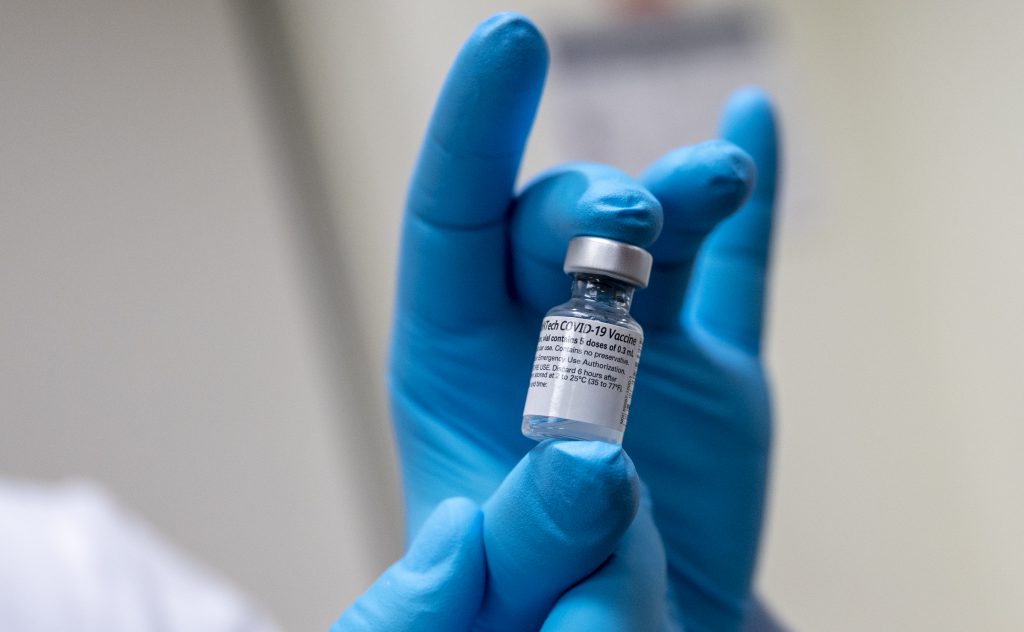Anti-Vaxxers, Scare Stories Nothing New
History shows examples of resistance going back centuries, since the smallpox vaccine.

Pfizer-BioNTech COVID-19 vaccine. photo by Lisa Ferdinando. U.S. Secretary of Defense, (CC BY 2.0), via Wikimedia Commons
Anti-vaccination sentiment is on repeat in this era of COVID-19, as misinformation about unsafe vaccines and mutated DNA is recycled from vaccination and inoculation campaigns that date back to smallpox.
Smallpox was eradicated from the population in 1979. But prior to that, it showed up in waves since its estimated arrival in about 10,000 B.C. With up to a 30 percent mortality rate, smallpox would show up on the faces of those infected and would often leave disfiguring scars.
In fact, in Boston a prominent minister who learned of inoculation from his slave, Onesimus, and advocated for widespread inoculation, was attacked.
“His house was firebombed, (he and a physician he worked with) were raked through the mud in the press and in public opinion,” Najera said.
By the time a smallpox vaccine was introduced in 1796, misinformation abounded again about its efficacy and safety.
“It’s going to turn you into a cow because they’re taking the cow puss and giving that to you,” Najera said, repeating some of the misinformation that was passed around about the smallpox vaccine. “It’s going to make you have stillbirths because look at how many cows have stillbirths after getting cowpox, etc.”
Now, centuries later, Najera said the same kind of misinformation is being peddled about the COVID-19 vaccine, particularly that it’s going to damage DNA, cause mutations, cause cancer or cause abnormalities in an unborn fetus.
“That’s where we get into the realm of unhealthy skepticism,” he said.
Anti-Vaxxers Organizing
The first documented anti-vaccine group called the National Anti-Vaccination League appeared in 1866 after Britain’s government tried to mandate smallpox vaccinations for its constituents.
All sorts of messaging emerged from the group, including religious stances arguing that getting sick is part of God’s plan, and libertarian points of view that proclaimed the government can’t tell individuals what to do.
Skepticism and frustrations over vaccine mandates eventually led to a U.S. Supreme Court decision in 1905. Bostonian Henning Jacobson refused to get vaccinated and to pay a fine that was imposed on him as a result. He argued getting vaccinated was against his rights, but in Jacobson v Massachusetts, the court determined that the local Board of Public Health had the authority to issue vaccine mandates.
Jacobson paid the fine.
“It sets a precedent,” Najera said of the early 20th century case. “We end up with what we see now at play in the COVID pandemic: local and state governments having much more authority, much more of the power to institute public health guidances and mandates than the federal government.”
Mandates For Vaccines?
There are currently no state or federal mandates to get the COVID-19 vaccine, Najera said. And what history has shown is that mandates for such vaccines tend to fall out of favor according to age, he said.
Najera said that when Massachusetts mandated the smallpox vaccine for schoolchildren, it was pretty well accepted.
“And that’s been the case with many of the childhood diseases for the most part,” he said.
That’s not the case with other vaccines.
The COVID-19 vaccine is the most recent example of this, he said.
“The people who are being affected the most are the elderly and people with chronic conditions,” he said. “And for some reason, at a societal level…we don’t care as much. (We say) ‘You had a good life. Sorry this happened to you.’ And so, that seems to play a lot into the acceptance of these things.”
But mandates are complicated in a system such as the U.S., where public health has become politicized.
What’s perhaps most effective in encouraging people to get the vaccine, Najera said, is peer conversations.
“People who have very ingrained beliefs listen to their peers and will act accordingly to whatever their peers are influencing them to do,” he said.
Listen to the WPR report here.
History Shows Anti-Vaccination, Misinformation Campaigns Are Nothing New was originally published by Wisconsin Public Radio.
More about the Coronavirus Pandemic
- Governors Tony Evers, JB Pritzker, Tim Walz, and Gretchen Whitmer Issue a Joint Statement Concerning Reports that Donald Trump Gave Russian Dictator Putin American COVID-19 Supplies - Gov. Tony Evers - Oct 11th, 2024
- MHD Release: Milwaukee Health Department Launches COVID-19 Wastewater Testing Dashboard - City of Milwaukee Health Department - Jan 23rd, 2024
- Milwaukee County Announces New Policies Related to COVID-19 Pandemic - County Executive David Crowley - May 9th, 2023
- DHS Details End of Emergency COVID-19 Response - Wisconsin Department of Health Services - Apr 26th, 2023
- Milwaukee Health Department Announces Upcoming Changes to COVID-19 Services - City of Milwaukee Health Department - Mar 17th, 2023
- Fitzgerald Applauds Passage of COVID-19 Origin Act - U.S. Rep. Scott Fitzgerald - Mar 10th, 2023
- DHS Expands Free COVID-19 Testing Program - Wisconsin Department of Health Services - Feb 10th, 2023
- MKE County: COVID-19 Hospitalizations Rising - Graham Kilmer - Jan 16th, 2023
- Not Enough Getting Bivalent Booster Shots, State Health Officials Warn - Gaby Vinick - Dec 26th, 2022
- Nearly All Wisconsinites Age 6 Months and Older Now Eligible for Updated COVID-19 Vaccine - Wisconsin Department of Health Services - Dec 15th, 2022
Read more about Coronavirus Pandemic here





















